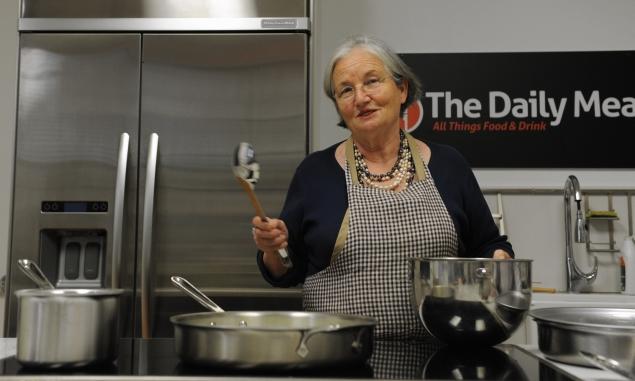
After spending years teaching cooking in the famed Périgord region — including the hosting of her now-famous “Foie Gras Weekends,” a three-day course teaching the Périgord cuisine, and the founding Ecole d’Art et Tradition Culinaire du Périgord, the region’s first cooking school — she gained recognition from world-renowned chef Joël Robuchon. It was Robuchon who reportedly introduced the idea to Mitterrand of asking Mazet-Delpeuch to be head chef, after the president said he wanted a master cook who could create meals from his childhood, the ones his grandmother once made for him. Robuchon instantly knew whom he should refer.
“When Joël heard that the president wanted a woman to cook for him, he said, ‘I know someone,'” Mazet-Delpeuch tells The Huffington Post.
Although the movie, directed by Christian Vincent, is loosely based on her memoir and the public recollections of her life, Mazet-Delpeuch doesn’t really view the onscreen story as purely biographical. Rather, it’s more about the love of food and cuisine.
“I didn’t receive the idea of the film like it was going to be an exact biography. In fact, to start, I didn’t believe that my life could make a film,” she says in an interview with The Examiner.
After her two years at the Elysée Palace, she returned to her native farmhouse, and it would be a decade later when she would hold another position. Known for her no-nonsense demeanor and a knack for fresh cooking, she applied for an unlikely new job: a chef position serving an all-male crew of 60 scientists on a French base in Antarctica.
“I thought I needed adventure, so I went on the Internet and found something in Antarctica,” Mazet-Delpeuch says in an interview with Good Food magazine.
Although the position was intended for a man and someone much younger, the 60-year-old Mazet-Delpeuch persisted and got the job.
“I learned the people who organized the base from Paris felt a woman was too fragile. But I know that men, especially 30 years old, are not that strong, being separated from their family, especially young children,” she says in Good Food.
Mazet-Delpeuch describes her revelation about cooking food in the Antarctic: It was something that was quite contrary to her position serving Mitterrand.
“In Antarctica, they didn’t want home food,” she says in Good Food. “Home food reminded them home.”
Her unusual and varied positions may be perceived as something to boast about, but Mazet-Delpeuch seems well grounded and humble about her travels and accomplishments. At age 70, she still lives in a secluded part of Périgord, in a 700-year-old farmhouse that has been in her family for generations. She reportedly said to a traveler that she lives almost like her grandmother did. With very few kitchen appliances and 100-year-old utensils and pots and pans, she may have traveled the world, but she is well grounded to what matters — the elemental joys of food.
In an interview with the New Zealand Herald, Mazet-Delpeuch aptly describes why she cooks: “Cooking has never been a career for me. It is a passport for adventures.”
Colby Tibbet studies journalism at Fresno City College. He is the Filmworks media relations and communication intern.
